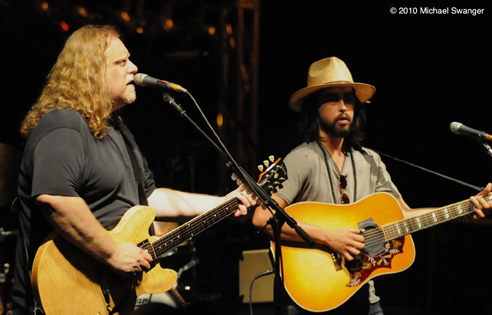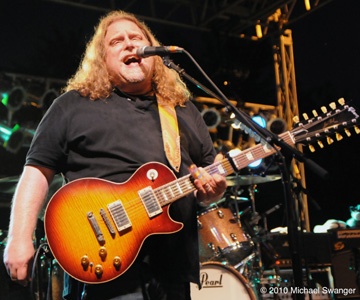
Photos by Michael Swanger
Gov’t Mule with Jackie Greene
Walnut Street Bridge
Des Moines, Iowa
August 22
As Warren Haynes and Jackie Greene harmonized their way through two iconic rock choruses to end this night and their tour, the emotional humidity for long-time Mule fans was thick in the air. As the last show before the tenth anniversary of Allen Woody’s passing, it felt unspoken but acknowledged that this riverside revival was special in ways rare and splendid.
Staring down the sun for a surprisingly small crowd, Greene and his quartet opened the show with a very solid set, featuring tunes off their well-received Till The Light Comes. “Solid” can be a cursed blessing; the band sounded neither tired nor snappy, which left plenty of room for Greene‘s aching vocals and poetry. The downside hints that this band has not found its own twist on the Americana vibe yet. With rockers like “Shaky Ground” and “Farewell, So Long, Goodbye” and slow burner “A Moment of Temporary Color” featured amongst killer versions of Greene’s “Hollywood”->”Taxman” and the Dead’s “Deal,” Greene seems to be one name on a very short list that could fill the void left by Sticky Fingers era Stones or the Rolling Thunder Revue. If Greene can unlock a few more nuances and fine tune his band’s mojo, he could ascend past contemporaries like Oscar winner Ryan Bingham sooner rather than later.
You would expect a few belts to loosen on the last night on the road, and when Mule bassman Jorgen Carlsson assumed the position for the “Hollywood->Taxman” jam, he showed the aggressiveness that his predecessor, Andy Hess, lacked in certain circumstances. That’s no knock on Hess, a fine bassist and tremendous musician. They are simply two different cats, who approach and provide the deep end with different tastes. Fellow Mule 2.0 addition, keyboardist Danny Louis shined brightly on “Deal,” leading perfectly up to the set closer, a beautiful take on “Sugaree,” featuring Haynes on vocals and slide.
It is a blessing that a consummate master such as Haynes is so giving of his gift. And bless the stage he did; with a cleaner-cutting tone closer to Ry Cooder than Duane Allman, he traded licks with Jackie playing an acoustic, then with Louis on the organ. Greene took a nice harmonica solo, and Haynes started trading again. Those last few moments of Greene’s set showcased the chemistry that he and Warren have developed over the last couple years of running together, and said chemistry wasn’t done for the night.

The hour-long opener gave way to thirty minute break, which ended sharply with the opening trio of “Bad Little Doggie,” “Steppin’ Lightly” and a ballsy “Broke Down on the Brazos.” The first true Mule majick of the night came with the kora-like intro to “Railroad Boy.” A traditional folk song sometimes known as “Butcher Boy,” the tale of unrequited love’s tragic end makes for some damn fine Zeppelinship. Yet “Railroad Boy” comes as much from the Mule’s tradition as Zep’s. After all, this is a band that featured a bassist/mandolinist in a power trio to dramatic affect- it’s a natural continuation of what Mule 1.0, and Allen Woody, were building.
“RRB” led into a soulful “Forevermore”, a minor-key beauty off 2009’s By A Thread. Traffic’s “Empty Pages” came next, and the psychedelia swirled into one of the Mule’s underrated gems, “New World Blues,” the finale on 2004’s Deja Voodoo. The song’s coda is a money spot for Haynes, and always includes some of his finest playing on any night. His graceful ending led lovingly into the Van Morrison standard “Into the Mystic.” Danny Louis took the opportunity to play trumpet and keyboard simultaneously with Haynes showing a softer touch on his sweet-toned ES 335. A nice extended jaunt through a gospel shuffle led into the warhorse closer “Soulshine,” and set one finished strong.
Set two resumed in spectacular fashion, as Greene joined Haynes onstage for a charmed version of Warren’s “The Real Thing.” First recorded for Phil & Friends’ There and Back Again, the song was revitalized by Greene’s presence. Talking with Haynes after the show, he himself was surprised to find out that Greene had started to work it up during his own time in Phil & Friends, and then brought it to Warren once they started touring together.
Next was a deeply-felt cover of the Dose classic, “John the Revelator”; only this time, Haynes would up the ante and inserted the chorus from Tom Wait’s “Jesus Gonna Be There” off the Grammy-winning Bone Machine (1992). Much like Jethro Tull’s “Hymn 43,” the original chastises the willful shortcomings of a believer juxtaposed against the lofty call of the belief. Here, Haynes’ quote felt like true gospel in a way that no mainstream CCM or gospel artist could realize, much less replicate.

A Woody-era version of Marley’s “Lively Up Yourself” was followed by Nathan Dale, of the JGB, suiting up for “32/20 Blues”; it was here that Carlsson put down a bass solo fitting of his station. “Drums” followed; it is too easy to overlook Matt Abts. He truly is the finest all-around drummer in the jamband world right now, and that claim has depth and merit. A romp through the Ben Harper-esque “Brighter Days” preceded the searing blues clinic that was “Inside Outside Woman Blues.” “Blindman in the Dark” closed the second set, giving a lyrical clue for the encore to come- “The only chance you got… like a blindman in the dark.”
Gov’t Mule ended their summer tour on the same bridge where Des Moines last saw Allen Woody stand, ten very long years ago, and as they brought Jackie Greene back for the Garcia/Hunter classic, “Loser,” they seemed to toll the bell solemnly in memoriam: “Put your gold money where your love is, baby, before you let my deal go down”: a lyric, in a certain light, for those who are willing to gamble what is most precious without having the clarity to gauge the risk. Warren then brought the rhythm section of the JGB, Jeremy Plog and John Hofer, to the stage for the Lennon/McCartney treasure, “Don’t Let Me Down.” And as Warren and Jackie throatily tore into the chorus with the fervor of true love, I personally wondered how much was meant for a departed lover, and how much might have been earmarked for a departed brother. Some people read too much into these things, perhaps, but it rang deep and true. After all, “It’s a love that lasts forever…”


No Comments comments associated with this post